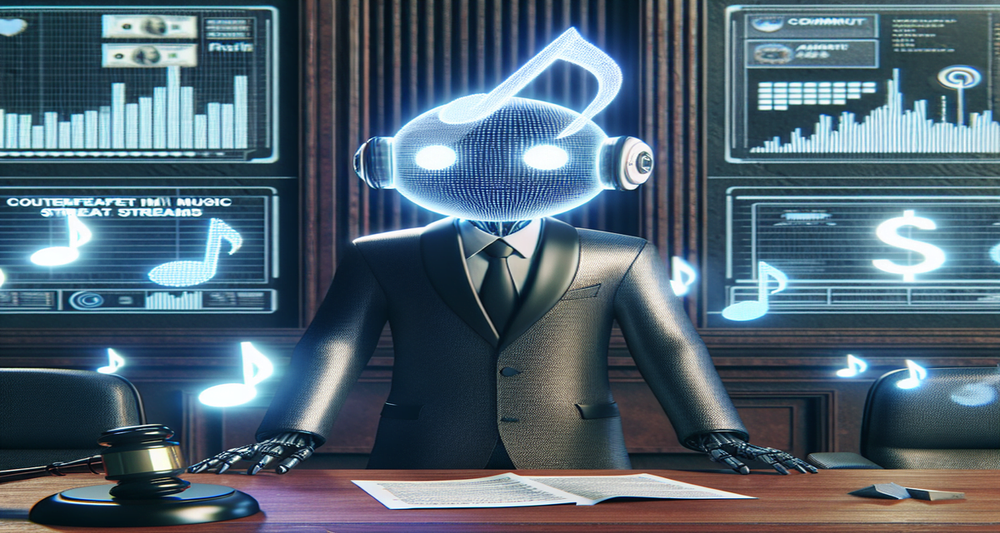In a groundbreaking case that reflects the growing intersection of technology and creativity, a criminal indictment has been handed down to an AI music maker. The charges allege that the AI software was used as part of a sophisticated $10 million streaming fraud scheme, shocking the music industry and raising questions about the governance of emerging technologies.
The Anatomy of the Fraud
The Department of Justice (DOJ) has revealed that developers and users of this AI-powered music creator were complicit in orchestrating a large-scale scheme to inflate streaming numbers for various tracks. Here’s how the operation was thought to function:
- AI-Generated Songs: The software generated an enormous catalog of AI-produced songs.
- Automated Streams: These tracks were then fed into streaming platforms, where software bots artificially inflated their play counts.
- Revenue Generation: Higher stream counts led to increased revenue payments from streaming services, totaling around $10 million in ill-gotten gains.
How the System Was Manipulated
The use of bots to manipulate streaming metrics is not a new trick in the music industry, but this case stands out due to its reliance on AI-generated music. Most streaming services pay artists and record labels based on the number of times their songs are played. By using bots to inflate these numbers, the perpetrators were able to significantly increase their earnings. The DOJ asserts that the AI-generated content was specifically chosen because it could be produced in massive quantities at minimal cost, making the scheme even more lucrative.
The Scope of the Fraud
This scheme involved various stakeholders, including certain developers, streaming platform insiders, and several tech-savvy individuals. The fraudulent activity spanned over multiple years and involved hundreds of thousands of AI-generated songs. According to the DOJ, the network was well-organized, making it challenging to detect. The investigation, which has been ongoing for months, has finally led to the indictment and potential dismantling of the operation.
Key Players Involved
Authorities have not released detailed information about all the individuals involved, but some key players have been identified:
- Lead Developer: The primary individual behind the AI software’s architecture.
- Co-Conspirators: A group of tech insiders who facilitated the deployment of the bots.
- Platform Insiders: Employees from streaming services who might have turned a blind eye or participated knowingly.
The Broader Implications
This case is a bumper wake-up call for the music industry, which has already been grappling with the implications of AI and machine learning on the creative process. Here are some questions that the industry must now confront:
- Regulation: Will there be new regulations governing the use of AI in music production?
- Security Measures: How can streaming platforms improve their security protocols to avoid being manipulated?
- Ethical Concerns: What are the ethical implications of using AI for content creation and monetization?
- Transparency: How can transparency be ensured in the metrics provided by streaming platforms?
Future of AI in Music
AI technology has the potential to revolutionize the music industry in many positive ways, from enhancing creativity to democratizing access to music production tools. However, this incident serves as a critical reminder that technology’s benefits must be cautiously balanced against its potential for misuse. Stricter guidelines, better oversight, and improved technological defenses will be essential in ensuring that AI’s role in the music industry remains ethical and innovative.
What Lies Ahead?
The DOJ’s crackdown on this fraud scheme is an encouraging sign that authorities are keeping pace with the rapid advancements in technology. As this case progresses through the legal system, it will likely set precedents and inform future regulations surrounding AI-generated content and streaming services.
Vigilance for Ethical AI
This case emphasizes the need for all stakeholders, including developers, platforms, and regulators, to be vigilant about ethical AI use. More than ever, a cooperative effort will be necessary to build robust systems that can withstand fraudulent activities while still fostering innovation in the music industry.
For more details, you can read the original article here.
Disclaimer: The information provided in this article is for general informational purposes only and does not constitute professional advice. All content is based on information from sources believed to be accurate at the time of writing. However, the information may be outdated or subject to change. Always seek the advice of a qualified professional regarding any financial, legal, or health-related decisions. The author and publisher of this article are not responsible for any errors, omissions, or results obtained from the use of this information. Reliance on any information provided in this article is solely at your own risk.





 By
By
 By
By




 By
By
 By
By
 By
By




